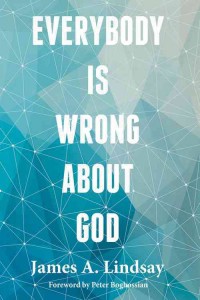Book Review: James A. Lindsay’s Everybody is Wrong About God

Is it time to move the societal debate about God’s existence to a new place? In his book Everybody is Wrong About God, author James A. Lindsay does indeed say that everyone is approaching the question of God in the wrong way. But some are more wrong than others.
In Lindsay’s view, those who are most clearly wrong are those who retain any belief in God. He dismisses them pretty quickly with a categorical brush-off: those who believe in God have lost the intellectual argument, and it’s time for those of us who don’t believe in God to not even deign to debate the issue. This is the first major issue he truly addresses in the book—should atheists continue to debate the existence of God? His answer is a firm “no.”
Lindsay argues that any argument by atheists over the existence of God only gives false fuel to those who are for the existence of God because it serves as a tacit acknowledgement that they have a side to be argued. The longer we argue there is no God, the longer the debate will last, under the false equivalence of religion and scientific truth. Think of Bill Nye’s debate against creationist Ken Ham and the criticism Nye received from some for even giving Ham the opportunity to defend creationism. Now extend that argument to anyone engaging in God debates and you pretty well have the first part of Lindsay’s book.
Lindsay is not saying that the New Atheists such as Sam Harris, Richard Dawkins, Daniel Dennett, and Christopher Hitchens had it wrong—they had it right for the times. Rather, Lindsay argues that their necessary contribution has, in twelve short years, won overwhelmingly in the battle of ideas. It’s time to move on.
This may be true in the Northeast, on the West Coast, and in a few other urban areas where attempts to discuss religion are often met with looks of “Why are you bothering to bring that up?” But as appealing as this argument is, given the whole tone of most of the Republican presidential candidates this year, it’s hard to say we have won the battle. While Lindsay acknowledges some rearguard actions may still be necessary and intellectual battles fought where appropriate, I wish I was as optimistic as he is that these such isolated cases and action will be increasingly unnecessary.
Given that Lindsay feels most people don’t intellectually believe in God anymore, his next main inquiry is an exploration of what people do mean when they say they “believe” in God. He argues that most of these people are actually articulating a more subtle need for community, comfort, and a set of morals, which they then equate with God. God is the embodiment of their ideas on what makes a good life. But once personified, they confuse their ideas of what makes for a good life with the actual individual they have created and then stubbornly argue for the existence of the said character, i.e. “God.”
Lindsay calls on atheists to recognize this phenomenon and change their arguments accordingly, addressing the needs that God personifies for the person rather than the actual belief in God. This is the next step of “post-theism.” Society must find ways to fulfill those needs in a secular way. Once those needs are addressed and met in those other ways, the need for “God” will quickly and naturally fall away.
The last part of the book briefly outlines the type of ethical system Lindsay believes is necessary to bring about human fulfillment without God. He admits he is necessarily vague on this, but outlines a general vision of what will have to be developed, a vision that will strike humanist readers as very humanistic.
Everybody is Wrong About God is a thought-provoking read for active humanists who are amenable to Lindsay’s declaration that it’s time to reshape our arguments regarding the existence of God. If only we could easily move beyond a need to argue about God’s existence and focus instead on how to meet peoples’ emotional and ethical needs without the idea of God. Addressing those needs with rational and experience-driven ideas and social conventions would be a major breakthrough in societal thinking. But whether society has reached the point where this is possible will be up to the reader and the world they are experiencing right now. I’d be happy if Lindsay is right and although I’m not sure we are there quite yet, maybe it’s at least time to talk about moving the debate in that direction.
